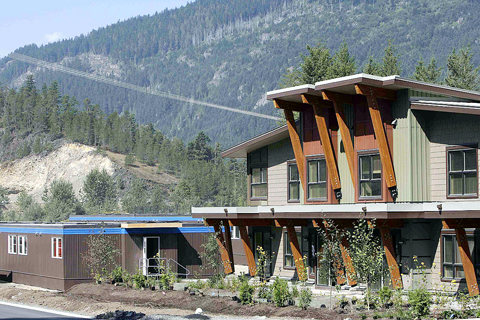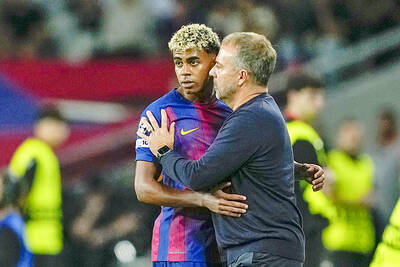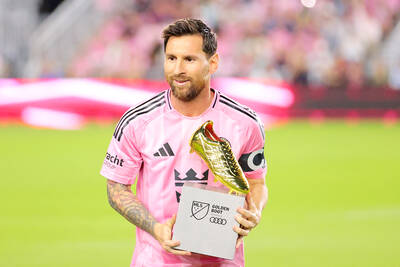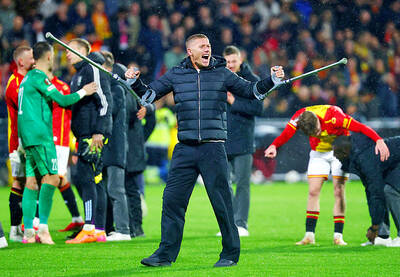One’s billed as an urban oasis, the other an Alpine escape.
One is millions of dollars over budget, the other raking in the cash.
It’s a tale of two very different athletes’ villages for next year’s Winter Olympics, but among the things they have in common is this: Both have given Nejat Sarp a full head of gray hair.

PHOTO: REUTERS
“Half is for Whistler and the other half is for Vancouver,” said Sarp, vice president of services and villages for the Vancouver Organizing Committee.
With six months until the Games, the athletes’ village in Vancouver and the one in Whistler are expected to be completed on time for the organizing committee to take over in November.
Together, they will house about 5,000 athletes and officials and provide services from post offices to play rooms.
Vancouver’s is all glass and steel, overlooking False Creek near downtown; Whistler is wooden homes against a backdrop of trees and mountains.
“We have to have a sense of place so that people know that not only am I attending an Olympics or Paralympics, that not only am I in Canada, nor only am I in BC, but I’m also in Whistler or in Vancouver,” Sarp said.
In Vancouver, the village site encompasses space for a dining hall that will later become a grocery store for the housing complex.
In Whistler, athletes will eat inside a jumbo tent.
POST-GAMES
The development in Whistler also includes an athletic center aimed at having athletes return to the mountain resort after the Games. There is also temporary housing that will be moved to other areas of the province after the Olympics.
Building villages in Vancouver and Whistler was part of the original bid for the Winter Games; transporting athletes in Vancouver to the host mountain resort was impractical and expensive.
Each village was designed with state-of-the-art environmental features.
The organizing committee is contributing funds to both projects — US$28 million to Vancouver and US$35 million to Whistler — the two villages were largely the responsibility of the respective communities to finance and build.
Whistler’s village is built on land donated by the government specifically for residential housing; Vancouver’s is built on prime inner-city real estate that cost a development company US$178 million.
The financing for construction of Vancouver’s village was at first almost entirely a private loan that was to be repaid from the proceeds of selling off 735 of the housing units following the Games. There are also 250 units of social housing and 120 rental suites.
Whistler chose to pay for its village through a combination of government money, tax revenues and post-Games resale.
MONEY WOES
Vancouver’s money woes began when construction costs started rising. Then the economy began to slow, and last autumn the financial company backing the developers began refusing to pay their loan.
A project originally expected to cost US$693 million was nudging toward US$924 million. And without the city stepping in, the job wasn’t going to get done. At the same time, sales of the units halted.
All the while, the development in Whistler continued below the radar.
The not-for-profit development company entrusted with building the complex of town homes, condominiums and rental units negotiated its loan with the BC Municipal Finance Authority, not private bankers.
Sales were strong from the start and now 97 percent of the 240 units are sold.
“It’s exceeded all expectations,” said Christopher Quinlan, a Whistler councilor.
Quinlan said the village, to be known as Cheakamus Crossing after the Olympics, will be a source of pride for the tight-knit community.
“To be there and be part of the legacy of the Games is going to be pretty phenomenal,” he said.
The community is exploring the idea of having athletes who stay there sign one door or create another memento.
In Vancouver, Meggs said he hopes that despite the financial challenges the village there sets a standard for the city.
“The Olympics are an opportunity for the city to reflect about what it wants to be,” he said. “The village is the city’s largest investment in the Olympics and it gives us a chance to see whether we’ve done a good enough job and whether we need to be better.”

Barcelona star Lamine Yamal would be motivated by criticism ahead of the Clasico, Barcelona assistant coach Marcus Sorg said yesterday. Teenage winger Yamal has been in the spotlight in the Spanish capital after joking that Real Madrid “steal” and “complain” during an appearance on a social media stream. Champions Barca face Real Madrid today in La Liga at the Santiago Bernabeu, looking for a fifth consecutive win over their rivals. “Lamine is a top player and I think [the criticism] will be motivating for him,” Sorg told a news conference. “I hope we all see him tomorrow [give] the best performance.” The 18-year-old Spain

‘A HISTORIC moment’: ‘I think we all need to take a step back and appreciate Leo Messi is playing in Major League Soccer,’ league commissioner Don Garber said Lionel Messi raised the Golden Boot. He then got Inter Miami started with his head. The Argentine opened the scoring with a diving header in the first half, then capped the scoring in the 96th minute as Inter Miami opened the MLS playoffs with a 3-1 win over Nashville SC in Game 1 of their Eastern Conference best-of-three first-round series on Friday night. Messi and Ian Fray had the assists on Tadeo Allende’s second-half tally for Inter Miami, who now get two chances to advance out of the first round for the first time in Messi’s two-and-a-half-year tenure with the team. Game

‘COMPLETE GAME’: ‘To be honest, I’m not sure about the history, but I’m very happy about what I did today,’ Yamamoto said through a translator after the game Yoshinobu Yamamoto pitched a World Series game from another era. Sandy Koufax had October outings like this, and so did Orel Hershiser, but those types of performances have vanished in modern baseball. Until this 178cm starter from Japan delivered like the aces of old. Yamamoto threw a four-hitter for his second consecutive complete game, the first in the World Series since 2015, and the defending champion Los Angeles Dodgers beat the Toronto Blue Jays 5-1 on Saturday night to tie their best-of-seven matchup at one game apiece. “It’s kind of the throwback,” Dodgers manager Dave Roberts said. “When he starts a game, he

Sean Dyche on Thursday achieved in his first game with Nottingham Forest what predecessor Ange Postecoglou could not in eight matches in charge: Win. Under its new coach, Nottingham Forest presented a concentrated display resulting in a 2-0 victory over Porto in the UEFA Europa League. It was the first victory for Nottingham in the competition and only the second overall this season, while Porto were defeated for the first time this season. Morgan Gibbs-White converted from the penalty spot in the 19th minute at the City Ground in West Bridgford, England. Igor Jesus doubled the advantage from another penalty in the 77th